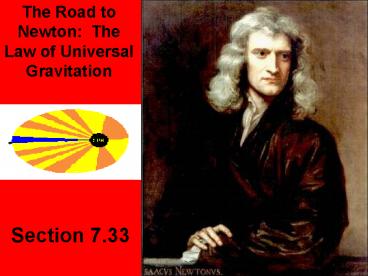The Road to Newton: The Law of Universal Gravitation - PowerPoint PPT Presentation
1 / 17
Title:
The Road to Newton: The Law of Universal Gravitation
Description:
... calculus and used a new measurement of the size of ... Principia confirmed work of Copernicus, Galileo, Kepler and heliocentrism. Fueled a surge in science ... – PowerPoint PPT presentation
Number of Views:123
Avg rating:3.0/5.0
Title: The Road to Newton: The Law of Universal Gravitation
1
Section 7.33
- The Road to Newton The Law of Universal
Gravitation
2
Scientific Revolution Copernicus to Galileo
- Aristotelian Universe
- Geocentric
- Planets revolve around the Earth
- Ptolemaic universe 200 A.D.
- Furthered Geocentric model
- Empyreanhome of the angels, immortal spirits
- Cosmos was a hierarchy of ascending perfection,
heavens were purer than earth
3
Nicholas Copernicus
- On the Revolutions of Heavenly Orbs (1543)
- Heliocentric view
- Earth and planets revolve around the sun
- Used a mathematical construct to support
- was a little simpler than math used to explain
Ptolemy's view
4
(No Transcript)
5
Brahe and Kepler
- Tycho Brahe
- Studied the movement of planets Mars
- Made vast amounts of detailed observations
Tycho Brahe's subterranean observatory on Ven, an
island in the Sound between Denmark and Sweden.
6
(No Transcript)
7
Brahe and Kepler
- Kepler
- Used the exact observations of Brahe
- Showed that Copernicus was wrong about the
perfect circular movements of planets around the
sun - Planets move in ellipses
- Unified the mathematical harmony of Copernicus
and the stubborn facts of Tycho Brahe - described the movement of the planets in explicit
formulas which any competent person could verify
Kepler's model to explain the relative distances
of the planets from the Sun in the Copernican
System
8
(No Transcript)
9
Galileo (1564-1642)
- Moon only reflects light and is made of
substances similar to Earth - observed its rough surface
- 1609 he built a telescope
- saw spots on the sun as if the sun were not pure
planets have breadth stars do not - Planets have satellites (Jupiter)
- this verified Copernican theory
- Declares that the Earth revolves around the sun
- Forced to recant his findings
- Observed (from Leaning Tower of Pisa?) that
objects with different weight struck the ground
at the same time - Bodies in motion inertia
- change in motion rather than origination
- dispensed with the need of an unmoved mover
10
(No Transcript)
11
The Achievement of Newton The Promise of Science
- Why do planet not fly off in straight
trajectories? - What force is involved?
- Newton unified the work of Kepler and Galileo
- Isaac Newton (1642-1727)
- Personally a secretive, petty, and vindictive man
in daily conduct - Drew on both Bacon and Cartesian traditions
(believed that light was not mere subjective
sensation but relied on math) - Invented calculus and used a new measurement of
the size of the earth - Principia Mathematica (Mathematical principles of
natural philosophy) 1687 or Principia - Asks what kept the earth in motion and why do
celestial bodies fall to the earth while the sun
and moon do not? - Kepler theorized that a force of mutual
attraction existed b/t bodies but Cartesian
theory rejected the absence of matter b/t to
separate bodies - Newton came w/ Universal Law of Gravity
12
Achievement of Newton Promise of Science
- every particle of matter in the universe attracts
every other particle with a force varying
inversely as the square of the distance b/t them
and directly proportional to the product of their
masses - Impact of Newton
- Principia confirmed work of Copernicus, Galileo,
Kepler and heliocentrism - Fueled a surge in science
- Made a fundamental reconception of the universe
(Paradigm shift in the Weltanschauung)
13
(No Transcript)
14
Impact of Newton
- His discoveries sparked the founding of
Institutionalization of knowledge - Royal Society of London 1662
- Royal Academy of Science France 1666
- Scientific periodicals and journals
- Practical applications
- Tidal movement
- Timepieces (Greenwich and the story of time John
Harrison and the H4) - Longitude
- Maps
John Harrison's fourth marine timekeeper H4
15
Impact of Newton
- Calculus
- military applications
- Improved firearms
- calculus allowed an exactness to curves and
trajectories - Steam
- Boyles Law
- Robert Boyle (1627-1691) used an air pump and
came up w/ Boyles law - under constant temperature the volume of a gas
decreases in proportion to the pressure placed on
it - Thomas Newcomen
- Invented a Steam engine in 1702 with limited
application - Used by James Watt to develop steam engine as we
know it - Later Applied to government
16
Scientific Revolution and the world of thought
- Science was called natural philosophy
- Gap between Christianity and natural science was
widening - Caused a profound readjustment on human view of
himself - No longer the center of creation
- Old cosmos comfortably enclosed and ranked
everything - Now humans were puny insignificant materials
flying through endless space - Bible didnt mention this
- Blaise Pascal, scientist and mathematicians
terrified of this - Most were optimistic
17
Scientific Revolution and the world of thought
- Alexander Pope on Newton Let Newton be and all
was light - Human reason could conquer all
- New view contributed to further secularization of
European society - Pushed religion to the side
- The universe operates under natural laws
- Is orderly and predictable
- Contains natural rightness and justice
- Ideas were more acceptable as a new view of the
human experience was emerging - Religion still strong
- Newton and Descartes wrote earnest tracts of the
truth of religious doctrines - Descartes (who questioned everything) said that
the customs of ones country were to be accepted
without question































